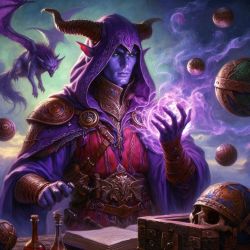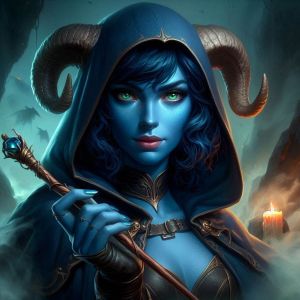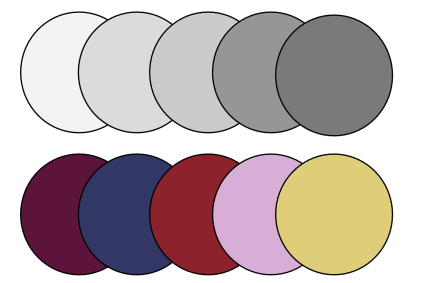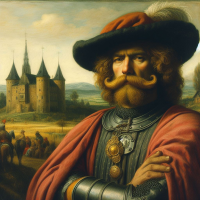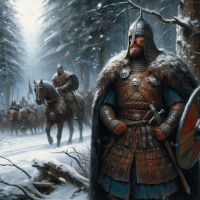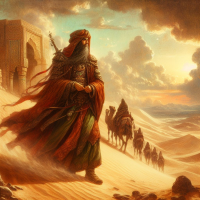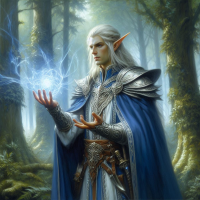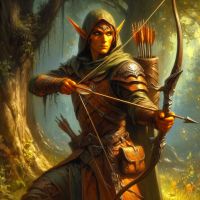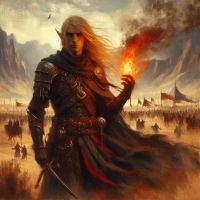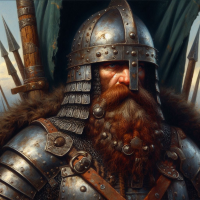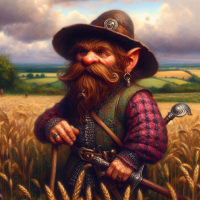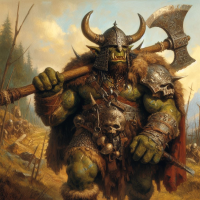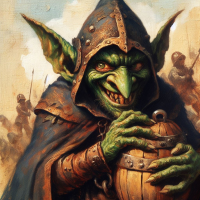Tieflings: Difference between revisions
No edit summary |
Littlebuggie (talk | contribs) |
||
| (19 intermediate revisions by 6 users not shown) | |||
| Line 1: | Line 1: | ||
{{Races | {{Races | ||
|Image = | |Image = TieflingAI.jpg | ||
|Name = | |Name = Denevir (Tieflings) | ||
|Nicknames = Devenir | |Pronunciation = Tief-ling | ||
|Languages = Notre Voix | |Classification = Tiefling | ||
|Height = 1.52m - 1.71m (5'0" - 5' | |Nicknames = Devenir | ||
|Weight = 52kg - 68kg (115lbs - 150lbs) | Tieflinere | ||
| | |Languages = Common, Notre Voix | ||
|Average Height = 1.52m - 1.71m (5'0" - 5'7") | |||
|STR = + | |Average Weight = 52kg - 68kg (115lbs - 150lbs) | ||
|Maximum Age = ~130 Years Old | |||
|STR = +1 | |||
|DEF = +0 | |DEF = +0 | ||
|AGI = +0 | |AGI = +0 | ||
|INT = +3 | |INT = +3 | ||
}} | }} | ||
== Introduction == | == Introduction == | ||
Nearly long forgotten, and looked at strangely, tieflings are a dispersed race across all of Eden. Coming from a collective broken home at some point, most had to move across Eden from the year 1511 to start a new life. Petrified, and not knowing where to go, most had slowly adjusted to other culture's accustoms, and began to lose their own. | |||
Most tieflings, Denevir amongst themselves, are far more jovial than one might think. They have endured much hardship. At first glance, it seems they are content with this, living by another nation's culture. However, this is far from the case. They long for a sense of belonging and even more so a place to express their roots back at Nous. | |||
Speaking in an almost forgotten language, the Denevir are tight-knit but are open and accepting to those who are willing to respect them as well. They will treat any other race as if they were their own, feeling great empathy for others as they know what it is like to lose what was rightfully theirs. A rejected race, but actively looking to find a place to call home. They do not let this keep them down, however, and instead use this as emotional strength to pull themselves up. | |||
{| class="wikitable" | |||
| colspan="4" |“The tiefling race? Well, most are willing to sing and dance if you just ask them… Always with a smile on their faces, too. I’ve never seen anyone else content with just existing. It’s almost motivational.” | |||
'''-An Anjyarri Jeweler traveling through Al-Jabrid.''' | |||
|} | |||
== Character Creation == | |||
=== Appearance === | |||
The tiefling race is born in shades of grey strictly from the years of living in the crevice known as Nous. Never has there been a naturally bright, or colorful, tiefling. With most not being able to grow past five foot six, 1.71 meters. The Denevir exists as a short and lithe race. As they get older, their horns grow into a naturally curved shape akin to rams, with some cases of horns growing upwards with no bend. Their eyes come in a vast array of colors. Most notably: yellow, blue, and any natural color, though far more vibrant to humans. A small branch of tieflings, however, can grow antlers instead. These resemble deer in a sense, but can be just as large as horns. | |||
Their ears are similarly pointed like an elf’s but shorter. Tieflings are also equipped with sharp canines. They have comparable builds to a human with regular limbs, though with long prehensile tails that stretch to about .7 to 1.1 meters that can be used to move along heavier objects. The younger the tiefling, the smaller their horns. However, tieflings live up to one hundred and thirty. Because of this, their aging is similar to humans, again, though they do not show physical signs of aging until seventy years old. | |||
[[File:Example of Tiefling woman.jpg|thumb|An example of a tiefling woman.]] | |||
[[File:Screenshot 2024-08-01 at 15.20.34.png|none|thumb|425x425px|First photo depicts possible shades of a tieflings real skin. The second photo depicts possible colors a tiefling may want to paint themselves.]] | |||
=== <u> | === Languages === | ||
{| class="wikitable" | |||
! colspan="4" |Denevir Linguae: Quick Guide | |||
|- | |||
! colspan="2" |<u>Greetings</u> | |||
! colspan="2" | <u>Races</u> | |||
|- | |||
!Notre Voix | |||
!Common | |||
! Notre Voix | |||
!Common | |||
|- | |||
|Bonjour | |||
|Hello/Greetings | |||
|Elfe | |||
|Elf | |||
|- | |||
|Au revoir | |||
|Farewell | |||
|Haut | |||
| High Elf/Pure Elf | |||
|- | |||
|Ami(s) | |||
|Friend(s) | |||
|Boisé | |||
|Wood Elf/Wild Elf | |||
|- | |||
! colspan="2" rowspan="12" | | |||
|Sombre | |||
|Dark Elf/Moon Elf | |||
|- | |||
|Soleil | |||
|Fire Elf/Sun Elf | |||
|- | |||
|Rocheux | |||
|Denur | |||
|- | |||
| Humain | |||
|Human(s) | |||
|- | |||
|Vert(s) | |||
|Faulskins(s) | |||
|- | |||
|Denevir | |||
|Tiefling | |||
|- | |||
! colspan="2" rowspan="6" | | |||
|- | |||
|- | |||
|- | |||
|- | |||
|- | |||
|} | |||
=== | === Naming Schemes === | ||
Despite not knowing home for many years, keeping names in the Notre Voix language is incredibly important to those close to their roots. Some tieflings may have Anjyarri or elven-sounding names, but in many homes the usage of Notre for names. | |||
{| class="wikitable" | |||
|'''Examples of Tiefling forenames:''' Jolie, Grace, Andre, Pierre, Luebella, Briette, Jean. | |||
|} | |||
{| class="wikitable" | |||
|'''Examples of Tiefling surnames:''' Alarie, Dubois, Cherean, Beaufort, Anouilh, von Joy, Aloi, Fleur. | |||
|} | |||
=== Cultures === | |||
Although tieflings may live in many places, they do not have a set home. Because of this, majority of tieflings have decided to live a nomadic lifestyle. They wish to be their own in Eden and never stick to one place. Many tieflings, as they have travelled for well over twenty years, have picked up from other cultures. Some tieflings speak that nations dialect by choice. Perhaps they join in on that nations events and when they are ready to leave, they carry a piece of that nation with them. | |||
{| class="wikitable" | |||
|- | |||
![[File:AnjyarrAI.png|frameless|200x200px]] | |||
![[The Empire of Anjyarr|The Sultanate of Anjyarr]] | |||
|At the mouth of the great Ifriq delta lies the emirate of Al-Khadir, capital of the great Empire of Anjyarr. It is a paradise of great wealth and prosperity in the midst of an unruly wasteland. Founded by a tribe of nomadic traders, whom settled due to the pleasant climate and geographic location near the Ifriq, Al-Khadir quickly became a trading hub for races all around the world. The city is a gateway to anyone wishing to enter the Southern world. It offers a large market for all kinds of goods, from elven trinkets to dwarven drinks, but also an extensive range of local wares such as tobacco, carpets, coffee, spices, and garments! | |||
|- | |||
![[File:MitronaAi.png|frameless|200x200px]] | |||
![[The Woodland Realm of Mitrona]] | |||
|Even the bravest of warriors have learned to fear the vast tracts of woodland that can be found throughout the realms of Eden. Surrounded by trees, it is all too easy to get disoriented and lost, but there is a more primal dread at work. In the forest, no one can ever be sure what is lurking just out of sight. Sounds are muffled, yet noises seem to come from everywhere – the snapping of twigs, a sinister rustling of leaves, and the creaking of the wind-stirred canopy above. Nowhere to hide, nowhere to run. Nothing to hear you besides the elemental wrath of the Azari’cerr. These people are highly-skilled elves with centuries of experience in their home environment, the forest. Once an outsider enters Myln Arbor - The mystical forest most of these people call home - it is unlikely he will leave in one piece. | |||
|- | |||
![[File:HelfCityAI.jpg|frameless|200x200px]] | |||
![[The Enlightened Kingdom of Luminion]] | |||
|The Scions of Illumination, as the Azari’cill call themselves, invoke this name because their existence reflects the pinnacle of civilization under the Mother’s wing. These luminous beings have blood that glimmers by magical properties. The glittering spires of the Azari cities stand like beacons in the lands where skill and enlightenment saturate the very air. The Azari’cill absorbed so much of this innate potential that when at war, it is said that the phalanxes of the Azari warhosts glow with robust power. An assault by an Azari’cill army is swift and carried out with flawless precision. The enemy is met with a forest of blades and barrages of elemental wrath. This claim of mastery also carries a deadly arrogance. The Azari come in glory, but they hail from a broken land, their elegant spires toppled and their statuary crumbled into the dust of a dead empire. The stories tell that it was the scourge of Fineall that ravaged the lands of silver; it was unavoidable. The age of the fallen spires has turned the empire of enlightenment into a spell-haunted ruin. Ever since the Time of Reinvention, the Azari’cill have managed to make peace with the lands they call home. | |||
|} | |||
== World View == | |||
{| class="wikitable" | |||
![[File:AverageChad.png|frameless|200x200px]] | |||
!On Attians... | |||
|'''Neutral''' | |||
“The most successful race of the humains… It’s strange to get a proper read on them. Some Attians will accept us with open arms. Others will insult you in their native tongue. All in all, it’s best just to let them be.” | |||
*Elise Robin, a traveling artist across Eden. | |||
|- | |||
![[File:AverageSadge.png|frameless|200x200px]] | |||
!On Hinterlanders… | |||
|'''Neutral''' | |||
“It seems the war has made them a lonely race. A diverse set of folks, too. One looked at me weirdly on my way up north. They must not see horns and tails every day. They’re similar to the Attians, but are somehow more… rugged. I can’t put my finger on it, quite.” | |||
*Charles François, a nomadic geomancer. | |||
|- | |||
|[[File:KhadanMale.png|frameless|200x200px]] | |||
!On the Khadan… | |||
|'''Slightly Positive''' | |||
“From what I’ve seen, they were more welcoming when… ah, forget it. They’re nicer than what most of us expected. And since the move-ins, some of us have indulged in their culture. It’s not all that bad. Even if it’s not home.” | |||
*Anne Ordin, a jeweler in Al-Jabrid. | |||
|- | |||
![[File:HighElfMan.png|frameless|200x200px]] | |||
!On High Elves… | |||
|'''Slightly Positive''' | |||
“After realizing the heat wasn’t for me, I slowly approached Luminion. Their ways aren’t exactly close to how it was back home, but the Haut were nicer than what one could expect. I don’t live here, but it’s nice to visit and look at the infrastructure.” | |||
*Marie Baudet, a roaming magician. | |||
|- | |||
![[File:WelfAI.jpg|frameless|200x200px]] | |||
!On Wood Elves… | |||
|'''Slightly Negative''' | |||
“Though it was well over thirty years ago, it all seems like it happened yesterday. I was just a small denevir. I am unsure how to feel about it now. I can’t look at a wood elf without thinking back to that day… Perhaps it is true that all wounds can be healed with time. Even though the Boise is generally an unforgiving race, I've seen a few with remorse. Strange...” | |||
*Arnoul, an elder tiefling in Luminion. | |||
|- | |||
![[File:DelfAI.jpg|frameless|200x200px]] | |||
!On Dark Elves… | |||
|'''Slightly Positive''' | |||
“A scattered race, much like us. Though they started in Anjyarr, some yearn for their homes back. I can certainly sympathize with that sentiment. Their endurance is admirable, too. I don’t think we’re too different, honestly…” | |||
*Randall, a warrior in Mitrona. | |||
|- | |||
![[File:DenurManAI.png|frameless|200x200px]] | |||
!On Denur… | |||
|'''Slightly Negative''' | |||
“They can be quite… negative. I don’t believe any Denevir has treated them poorly, but their grudges run deep into the ground. I hope one day they can learn to overcome their resentments. They can brighten the room if they truly want to.” | |||
*Henri Charles, a carpetmaker in Al-Khadir. | |||
|- | |||
![[File:HalflingAIMan.png|frameless|200x200px]] | |||
!On Halflings… | |||
|'''Neutral''' | |||
“I don’t usually see many around. I have heard plenty of stories, though. Some are thieving. So it’s best to steer away.” | |||
*Antoinette Fleur, a young tiefling in passing. | |||
|- | |||
![[File:OrcGrrrMan.png|frameless|200x200px]] | |||
!On Orcs… | |||
|'''Neutral''' | |||
“Seeing the size comparison of the average orc to the average denevir... it’s quite intimidating. I don’t usually see many of them, either. But some of them are nice.” | |||
*Claire, a Jundi for Anjyarr. | |||
|- | |||
![[File:GreedyLilThing.png|frameless|200x200px]] | |||
!On Goblins… | |||
|'''Neutral''' | |||
“I’ve seen a lot of wandering goblins, though their homes are with the orcs in Zadh. Don’t let their small size mistake you. They’re fast– I am pretty sure one stole a few coins off of me on my way to the market…” | |||
*Gabriel Aloi, a traveling merchant. | |||
|} | |||
== Character Traits == | |||
{| class="wikitable" | |||
! colspan="2" |Racial Traits - Tieflings | |||
|- | |||
!Arcane initiate | |||
|Players with this trait know the "Flame Arrow" spell without needing to be a spellcaster | |||
|- | |||
!Knowledgeable | |||
|Players with this trait get two extra lvl 1 spell slots and one extra lvl 2 spell slot. | |||
|- | |||
!Nightseer | |||
|Players with this trait get the night vision effect when entering dark spaces and during the night. | |||
|- | |||
!Piercing gaze | |||
|Players with this trait are immume to the "blindness" status effect. | |||
|- | |||
!Bodily resillence | |||
|Players with this trait are immume to diseases, venom, and poison. | |||
|- | |||
!Packmule | |||
|Players with this trait have a maximum weight cap of +20. | |||
|}__NOTOC__ | |||
{{Navtable_Races|class="mw-collapsible"}} | {{Navtable_Races|class="mw-collapsible"}} | ||
Latest revision as of 06:52, 25 October 2024
| Denevir (Tieflings) | |
|---|---|
| Pronunciation | Tief-ling |
| Classification | Tiefling |
| Nicknames | Devenir
Tieflinere |
| Languages | Common, Notre Voix |
| Average Height | 1.52m - 1.71m (5'0" - 5'7") |
| Average Weight | 52kg - 68kg (115lbs - 150lbs) |
| Maximum Age | ~130 Years Old |
| Stat Bonuses |
+1 Strength +0 Defense +0 Agility +3 Intelligence |
Introduction
Nearly long forgotten, and looked at strangely, tieflings are a dispersed race across all of Eden. Coming from a collective broken home at some point, most had to move across Eden from the year 1511 to start a new life. Petrified, and not knowing where to go, most had slowly adjusted to other culture's accustoms, and began to lose their own.
Most tieflings, Denevir amongst themselves, are far more jovial than one might think. They have endured much hardship. At first glance, it seems they are content with this, living by another nation's culture. However, this is far from the case. They long for a sense of belonging and even more so a place to express their roots back at Nous.
Speaking in an almost forgotten language, the Denevir are tight-knit but are open and accepting to those who are willing to respect them as well. They will treat any other race as if they were their own, feeling great empathy for others as they know what it is like to lose what was rightfully theirs. A rejected race, but actively looking to find a place to call home. They do not let this keep them down, however, and instead use this as emotional strength to pull themselves up.
| “The tiefling race? Well, most are willing to sing and dance if you just ask them… Always with a smile on their faces, too. I’ve never seen anyone else content with just existing. It’s almost motivational.”
-An Anjyarri Jeweler traveling through Al-Jabrid. |
Character Creation
Appearance
The tiefling race is born in shades of grey strictly from the years of living in the crevice known as Nous. Never has there been a naturally bright, or colorful, tiefling. With most not being able to grow past five foot six, 1.71 meters. The Denevir exists as a short and lithe race. As they get older, their horns grow into a naturally curved shape akin to rams, with some cases of horns growing upwards with no bend. Their eyes come in a vast array of colors. Most notably: yellow, blue, and any natural color, though far more vibrant to humans. A small branch of tieflings, however, can grow antlers instead. These resemble deer in a sense, but can be just as large as horns.
Their ears are similarly pointed like an elf’s but shorter. Tieflings are also equipped with sharp canines. They have comparable builds to a human with regular limbs, though with long prehensile tails that stretch to about .7 to 1.1 meters that can be used to move along heavier objects. The younger the tiefling, the smaller their horns. However, tieflings live up to one hundred and thirty. Because of this, their aging is similar to humans, again, though they do not show physical signs of aging until seventy years old.
Languages
| Denevir Linguae: Quick Guide | |||
|---|---|---|---|
| Greetings | Races | ||
| Notre Voix | Common | Notre Voix | Common |
| Bonjour | Hello/Greetings | Elfe | Elf |
| Au revoir | Farewell | Haut | High Elf/Pure Elf |
| Ami(s) | Friend(s) | Boisé | Wood Elf/Wild Elf |
| Sombre | Dark Elf/Moon Elf | ||
| Soleil | Fire Elf/Sun Elf | ||
| Rocheux | Denur | ||
| Humain | Human(s) | ||
| Vert(s) | Faulskins(s) | ||
| Denevir | Tiefling | ||
Naming Schemes
Despite not knowing home for many years, keeping names in the Notre Voix language is incredibly important to those close to their roots. Some tieflings may have Anjyarri or elven-sounding names, but in many homes the usage of Notre for names.
| Examples of Tiefling forenames: Jolie, Grace, Andre, Pierre, Luebella, Briette, Jean. |
| Examples of Tiefling surnames: Alarie, Dubois, Cherean, Beaufort, Anouilh, von Joy, Aloi, Fleur. |
Cultures
Although tieflings may live in many places, they do not have a set home. Because of this, majority of tieflings have decided to live a nomadic lifestyle. They wish to be their own in Eden and never stick to one place. Many tieflings, as they have travelled for well over twenty years, have picked up from other cultures. Some tieflings speak that nations dialect by choice. Perhaps they join in on that nations events and when they are ready to leave, they carry a piece of that nation with them.
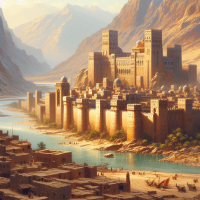
|
The Sultanate of Anjyarr | At the mouth of the great Ifriq delta lies the emirate of Al-Khadir, capital of the great Empire of Anjyarr. It is a paradise of great wealth and prosperity in the midst of an unruly wasteland. Founded by a tribe of nomadic traders, whom settled due to the pleasant climate and geographic location near the Ifriq, Al-Khadir quickly became a trading hub for races all around the world. The city is a gateway to anyone wishing to enter the Southern world. It offers a large market for all kinds of goods, from elven trinkets to dwarven drinks, but also an extensive range of local wares such as tobacco, carpets, coffee, spices, and garments! |
|---|---|---|
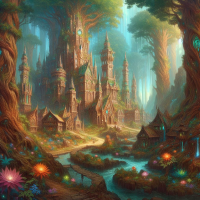
|
The Woodland Realm of Mitrona | Even the bravest of warriors have learned to fear the vast tracts of woodland that can be found throughout the realms of Eden. Surrounded by trees, it is all too easy to get disoriented and lost, but there is a more primal dread at work. In the forest, no one can ever be sure what is lurking just out of sight. Sounds are muffled, yet noises seem to come from everywhere – the snapping of twigs, a sinister rustling of leaves, and the creaking of the wind-stirred canopy above. Nowhere to hide, nowhere to run. Nothing to hear you besides the elemental wrath of the Azari’cerr. These people are highly-skilled elves with centuries of experience in their home environment, the forest. Once an outsider enters Myln Arbor - The mystical forest most of these people call home - it is unlikely he will leave in one piece. |
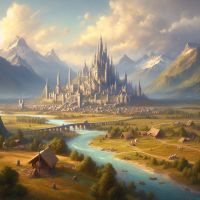
|
The Enlightened Kingdom of Luminion | The Scions of Illumination, as the Azari’cill call themselves, invoke this name because their existence reflects the pinnacle of civilization under the Mother’s wing. These luminous beings have blood that glimmers by magical properties. The glittering spires of the Azari cities stand like beacons in the lands where skill and enlightenment saturate the very air. The Azari’cill absorbed so much of this innate potential that when at war, it is said that the phalanxes of the Azari warhosts glow with robust power. An assault by an Azari’cill army is swift and carried out with flawless precision. The enemy is met with a forest of blades and barrages of elemental wrath. This claim of mastery also carries a deadly arrogance. The Azari come in glory, but they hail from a broken land, their elegant spires toppled and their statuary crumbled into the dust of a dead empire. The stories tell that it was the scourge of Fineall that ravaged the lands of silver; it was unavoidable. The age of the fallen spires has turned the empire of enlightenment into a spell-haunted ruin. Ever since the Time of Reinvention, the Azari’cill have managed to make peace with the lands they call home. |
World View
Character Traits
| Racial Traits - Tieflings | |
|---|---|
| Arcane initiate | Players with this trait know the "Flame Arrow" spell without needing to be a spellcaster |
| Knowledgeable | Players with this trait get two extra lvl 1 spell slots and one extra lvl 2 spell slot. |
| Nightseer | Players with this trait get the night vision effect when entering dark spaces and during the night. |
| Piercing gaze | Players with this trait are immume to the "blindness" status effect. |
| Bodily resillence | Players with this trait are immume to diseases, venom, and poison. |
| Packmule | Players with this trait have a maximum weight cap of +20. |
| Races | |
|---|---|
| Human Races | Attians · Khadans · Hinterlanders |
| Elvish Races | High Elves · Wood Elves · Dark Elves |
| Dwarvish Races | Denur · Halflings |
| Orcish Races | Orcs · Goblins |
| Other Races | Sylvani · Tieflings |
